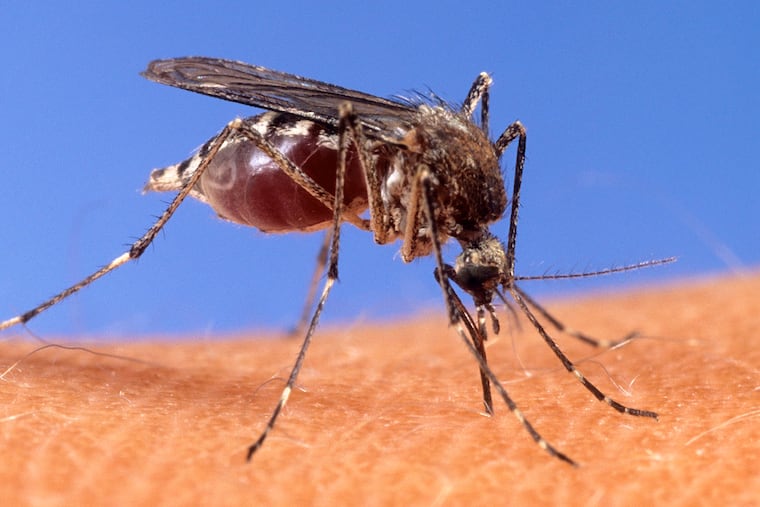Philadelphia mosquitoes are having an active West Nile virus season
West Nile virus depends on a balance between mosquitoes, birds, and the climate — making it hard to predict active season.

A little more than halfway through the mosquito season, the number of pests carrying West Nile virus has already exceeded last year’s total — and scientists aren’t sure why.
Since May, about 300 groups of mosquitoes in Philadelphia have tested positive for West Nile virus, compared with 224 groups for the entire May-October season last year, according to data from the Philadelphia Department of Health. There have been only three reports of someone contracting the illness in Philadelphia as of Aug. 20, though many more may have had it without knowing. About 80% of people who contract West Nile never have any symptoms, according to the Centers for Disease Control and Prevention.
Still, scientists are eager to unravel this mosquito mystery: Some years, there are a lot of mosquitoes carrying the virus. Others, infection rates among mosquitoes are low.
And although severe illness from West Nile is rare, it’s the most common mosquito-borne disease in the United States, causing fever and flu-like symptoms. In its most severe form, West Nile can cause neurological problems, brain inflammation, and debilitating symptoms akin to polio.
“This is serious and something that is important to try to prevent,” said Jonathan Miller, a pediatrician and chief of primary care at Nemours Children’s Health in Delaware.
» READ MORE: West Nile virus found in Philadelphia mosquitoes for the first time this summer
How does West Nile spread?
West Nile virus is a zoonotic disease, meaning that it jumps from animals to people. The conditions that allow it to proliferate — or not — are complex.
The virus circulates among networks of birds and mosquitoes. Mosquitoes infect birds, such as crows and American robins, which pass the virus to other mosquitoes that bite them, said Matt Helwig, the West Nile virus program specialist at the Pennsylvania Department of Environmental Protection.
Helwig thinks about West Nile virus as a three-legged stool: “One of the legs is the mosquito population, the other leg is the host population, and the third would be the climate,” he said.
Warmer weather, more mosquitoes
Mosquitoes thrive in hot and humid weather, which partially explains why mosquitoes in the Philadelphia areas are arriving earlier and staying later, according to Climate Center, a nonprofit group of climate scientists and journalists.
There are definitely a lot of mosquitoes out there this year, said E. Qadir Martin, the chief operating officer of Alpha to Omega Termite & Pest Control. Calls to his Philadelphia-based company requesting mosquito treatment are up by about 20% this year.
But more mosquitoes doesn’t necessarily mean more West Nile virus.
» READ MORE: Mosquitoes arrive earlier, stay later in Philly region because of climate change, data suggest
For West Nile virus to thrive in the mosquito population, birds need to get infected and act as hosts, said Karen Holcomb, a biologist with the CDC who studied the impact of climate on West Nile virus.
Holcomb studied one of the largest West Nile virus outbreaks in the U.S. — a 2021 episode in Maricopa County, Ariz. While a wetter-than-average summer was a leading factor, it wasn’t the only.
The area had an unusually low rate of West Nile virus in 2020, which meant that the following year, many birds hadn’t built up antibodies to protect themselves from the virus. As a result, there were a lot of birds susceptible to West Nile in 2021, and they spread it to the mosquitoes that bit them.
It is this dance between environmental conditions, birds, and mosquitoes that makes any single season of West Nile virus difficult for scientists to explain.
“Being such a complex transmission cycle, it is not easy to predict,” Holcomb said.
West Nile has a big season when all these circumstances line up exactly right. If the weather isn’t just right, the mosquitoes don’t multiply as they usually do, or the birds build up their antibodies in time, the summer’s a bust for this virus.
Preventing pests
In a year such as this, when mosquitoes are having a moment, what’s the best way to avoid getting bitten?
» READ MORE: How to prevent and treat mosquito bites
The key to West Nile virus prevention is eliminating conditions that allow mosquitoes to thrive — such as any source of standing water, overgrown shrubberies, and tall grass.
“That’s the gist of it, no matter how complicated anyone wants to make it,” Martin said.
Helwig recommends making insect repellent part of your outdoor routine. Just as you’d never hop on a bike without a helmet, don’t head into the yard without a bottle of spray, he said.